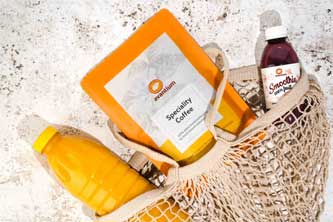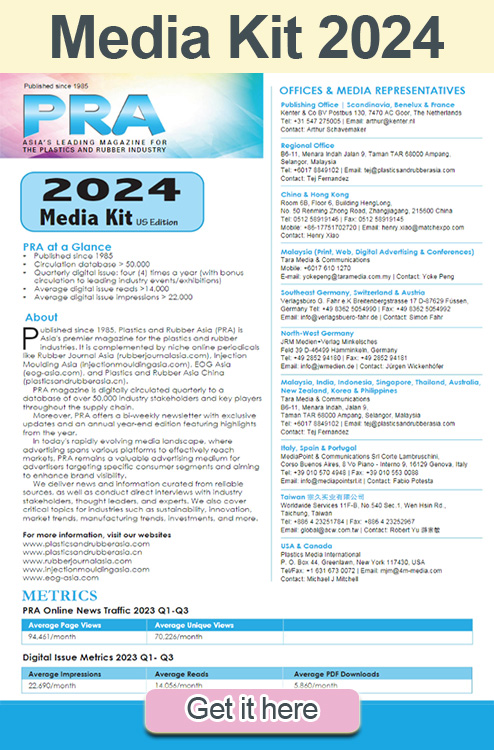Packaging: Avantium to supply PEF to Plastipak for food packaging in US; Food vacuum containers with Sabic’s ocean-bound PP content rolled out in Europe/UK, Asia next

Dutch renewable materials firm Avantium NV has signed a conditional offtake agreement with rigid plastic containers maker Plastipak for its plant-based PEF (polyethylene furanoate) material. In related news, the US Food and Drug Administration (FDA) has granted Food Contact Notification (FCN) approval for the use of Avantium’s PEF in food contact articles, effective from October 2024.
Plastipak supplies containers and packaging products to many of the world’s largest consumer products companies. Plastipak will purchase the 100% plant-based, recyclable polymer PEF from Avantium’s FDCA flagship plant for the use in beverage and food packages, for consumers in the US.
Over the past year, Plastipak says it has been actively involved in evaluating the application of Avantium’s PEF, a 100% plant-based, high-performance polymer that can be recycled in existing PET (polyethylene terephthalate) recycling streams. PEF is for instance included in the Critical Guidance Protocol from the Association of Plastic Recyclers (APR), one of the most universally accepted measures for assessing recyclability in plastic packaging design.
Plastipak says it has successfully demonstrated the enhanced performance of PEF in monolayer and multilayer bottle applications. PEF is distinguished by its barrier properties, which extend the shelf life of food and beverages, its higher mechanical strength that allows for less material, and its lower processing temperature that reduces energy consumption compared to traditional plastics derived from fossil resources.
PEF’s characteristics make it an ideal monolayer packaging material and also provide benefits when used in conjunction with PET (polyethylene terephthalate). In multilayer PET packages, PEF serves as an effective barrier layer to ensure product shelf life when a single PET layer is insufficient.
Plastipak, in collaboration with Avantium, is now set to further validate the use of PEF in Plastipak’s food and beverage packages on a commercial scale in the US market.

Meanwhile in other news, chemical firm Sabic reports that B!POD, a business unit of SAES Getters, has selected Sabic’s OBP-based polypropylene (PP) resin as the material for their containers, replacing standard virgin PP. The partners selected Sabic PP 576P, a high-gloss grade from the company’s Trucircle portfolio of circular resins. The container material has an OBP feedstock content in the range of 50%.
The source of the OBP in Sabic’s material is abandoned used plastic collected in regions within 50 km of shorelines and then converted to plastic feedstock by means of advanced recycling. The PP resin produced with this recycle is supplied in natural colour to C.E.L. (Costruzioni Elettromeccaniche Legnaghesi), an Italian player specialising in the processing of thermoplastic resins.
C.E.L. adds special masterbatches to mould the B!POD containers in different sizes and several distinct custom colours. At the end of their service life, the reusable containers are fully recyclable in existing PP material streams.
Ginevra della Porta, Chief Innovation Officer at SAES Getters & co-founder of B!POD, comments: “This innovation embraces sustainability from the very concept to end use – with an advanced vacuum technology to minimise food waste, with Sabic’s OBP-based material that prevents used plastic from polluting our oceans, and with containers in a range of colours each dedicated to an endangered species, such as orangutan orange or whale grey, it is designed to raise the awareness of consumers.”
He adds that the company’s market research has indicated that reusable rigid containers for food preservation can potentially eliminate the consumption of more than 300 non-recyclable plastic bags per person and year, which corresponds to a per capita release of 30 kg of CO2 to the atmosphere.
The selected OPB-based PP 576P resin is a food contact approved grade, free of PFAS and BPA. It offers ease of processing and delivers dimensionally stable parts with low warpage, good impact strength and high gloss as moulded.
The ocean-bound plastic based solution is fully certified under the International Sustainability & Carbon Certification (ISCC) PLUS chain of custody.
The B!POD containers have been fully rolled out across the European Union, in Switzerland and the UK by mid-2024, with Asian countries to follow in 2025.
Subscribe to Get the Latest Updates from IMA Please click here
©2024 Injection Moulding Asia. All rights reserved.












